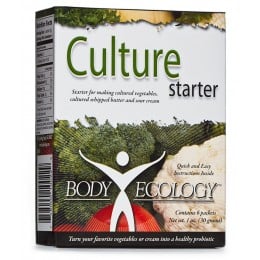Body Ecology Culture Starter: Selina Naturally

Probiotics aren’t a health fad. They date back thousands of years to when humans first began intentionally fermenting foods.
Fermentation was once a way to preserve food. This is because the fermentation process keeps food (like cabbage or milk) from spoiling with active enzymes and beneficial bacteria. The texture and flavor did change a bit but this was also quite enjoyable. Humans love the sour taste and it should be included in our diet. Sour helps us resists sweets.
These days we know a little bit more about the microbiota—or probiotics—that make fermentation possible.
For example, we know that many of these bacteria and yeast promote health in many ways including educating and strengthening our immune system. Diabetes, allergies, autoimmune disorders, and even mental health disorders are more common than ever now. And many researchers believe that this is linked to a lack of diversity in the beneficial — or I prefer the term “mutualistic” — microbiota living in the gut.
Unfortunately, the most beneficial fermented foods have never been a part of the American diet and if you do want to eat them you have to purchase them in a cutting edge health food store or make them at home. The loss of traditional fermented foods coupled with a diet rich in processed, refined foods means that the average person is walking around with an imbalanced gut and is vulnerable to disease. Actually all diseases, including cancer, heart disease, arthritis, diabetes and Hashimoto autoimmune disease, begin in the gut.
The solution is to bring back fermented foods. Make them a regular part of every meal and you too will soon begin to realize what the recent buzz about fermentation is all about.
Fermented Vegetables May Be a Fantastic New Food For You
At Body Ecology, we have long advocated the use of fermented vegetables. They actually have certain benefits over just taking a probiotic supplement. The most important benefit is that fermented vegetables have more microbial bio-diversity.
To explain this in more detail, imagine that you want to ferment these five vegetables: cabbage, carrots, garlic, onion and ginger.
Each of these vegetables grew in a field and from the very beginning of its life the vegetable was covered in beneficial bacteria. These bacteria formed a sophisticated “symbiotic relationship” with each other as the plant grew.
When you bring those vegetables into your kitchen, cut them up and ferment them you are eating an amazing diversity of beneficial bacteria as well as the wonderful “wisdom” of Nature”.
Using A Probiotic Starter Culture
In order to create a consistently successful batch of fermented vegetables Body Ecology recommends using a starter culture. Starter cultures speed up the fermentation process. Basically they jump-start the fermentation instead of waiting for the resident — aka endogenous — microbiota to begin colonizing the vegetables.
The probiotics in Body Ecology Culture Starter have been selected to protect and improve the health of your gut. For example, Lactobacillus plantarum produces folate, is resistant to many antibiotics, is anti-viral and has been shown to inhibit histamine and other “biogenic amines” like putrescine, tyramine and cadaverine that form in the gut. Purtrescine? Cadaverine? Just seeing the names of these biogenic amines you can tell immediately that you don’t want them forming in your gut, but unfortunately they do.
Some people have a “histamine reaction” when they eat fermented foods so they avoid them. But reacting to fermented foods is a “symptom” telling you to look for a “root cause” to the problem. The root cause of a histamine reaction to fermented vegetables, for example, is usually a pathogen growing in the large or small intestine. The pathogen is causing a gut infection that must be treated under the care of a functional medicine doctor.
Histamine, under normal circumstances, is a molecule that helps regulate digestion and brain function. But Histamine out of balance can cause a lot of misery including gas, bloating and pain, a flushing to the face, hives, irritable bowel syndrome and other more serious conditions. Histamine is also found in aged, cured, fermented and cultured and spoiled foods. Having a healthy gut along with the added protection of L. plantarum preventing histamine formation is a real plus for all of us.
DONNA GATES is creator of the Body Ecology Diet and an expert in the field of digestive health, nutrition, and diet. For over twenty years she has taught others about their inner ecosystem and the value of cultured foods.








